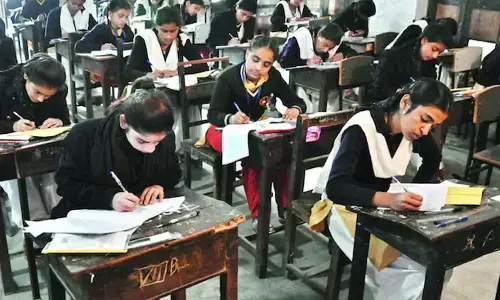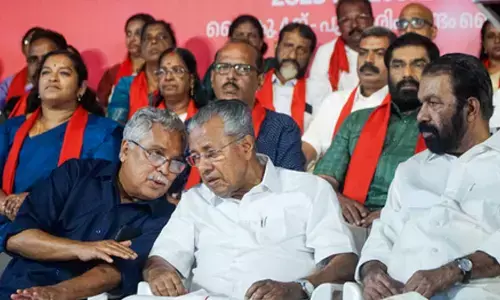Indian corporate world rejoice over Bali deal

Indian Corporate World Rejoice Over Bali Deal, Our World Is Not For Sale, WTO. The Bali Ministerial meeting of the WTO has not bombed. And lo and behold! As the ‘Our World Is Not For Sale’ (OWINFS), a global network of NGOs points out, “Avoiding a total meltdown of the WTO is being touted as a breakthrough, which just shows how de-legitimate the corporate-led model of trade liberalisation, embodied by the WTO, has become.”
.jpg) The Bali Ministerial meeting of the WTO has not bombed. And lo and behold! As the ‘Our World Is Not For Sale’ (OWINFS), a global network of NGOs points out, “Avoiding a total meltdown of the WTO is being touted as a breakthrough, which just shows how de-legitimate the corporate-led model of trade liberalisation, embodied by the WTO, has become.”
The Bali Ministerial meeting of the WTO has not bombed. And lo and behold! As the ‘Our World Is Not For Sale’ (OWINFS), a global network of NGOs points out, “Avoiding a total meltdown of the WTO is being touted as a breakthrough, which just shows how de-legitimate the corporate-led model of trade liberalisation, embodied by the WTO, has become.”Leading the pack of the corporate-friendly governments and their spokesman was our very own Commerce Minister Anand Sharma who not only chickened out after spewing ‘fire and brimstone’ against the governments of developed countries; but actually making out a great virtue of abjectly surrendering to the absolutely insensitive and immoral efforts of the developed world to protect the interests of their corporate agri-business at the cost of millions of marginal farmers and still bigger numbers of hungry and under fed in the developing countries.
Obviously, big guns of the Indian corporate world are extremely elated. Virtually all major industry bodies are quite vocal in sharing the sense of euphoria over the Bali deal; they were almost ecstatic that the Doha development round which appeared to be in tatters appears to have survived in Bali. It is, therefore, necessary cut through the smokescreen of triumphalism that likes of Anand Sharma has so dexterously unleashed. In order to do so, it would be necessary to demystify the background, context, agenda and the outcome of what transpired in Bali.
What was the agenda in the Bali meeting? There were essentially two issues; one trade facilitation and other of agricultural subsidy. Observers, particularly those in India, have been unanimous in accepting that the trade facilitation was clearly an agenda of the developed countries to the extent that it was attempting to unilaterally impose conditions in customs and infrastructural efficiency in the developing countries which would boost their trade potential disproportionately. Reaching an agreement became crucial for rich countries to infuse a fresh dynamism in their respective economies which otherwise continues to gasp from the effects of recession which refuses to go.
But the question of agricultural subsidy became far more vital in India. In India, the number of households dependent upon agriculture is 12 crores. In the run up to the Agreement on Agriculture (AoA) in the late eighties and early nineties, the Indian government had claimed that for us it was not merely an issue of trade; but a livelihood question for majority of our people. But now with the debate opening up in the run up to Bali, the obnoxious nature of the AoA stares at our face.
United States and Europe massively subsidise their agriculture. In US, government expenditure by way of subsidies to the agricultural sector is nearly half of the GDP originating from its agriculture. The figures for Europe are similar. In United States, where cash transfers are basic means of subsidising agriculture, only 1.1 percent of total employment is in agriculture (2012 figure), implying only about 4 lakh households’ livelihood depends on agriculture. Besides, since bulk of the transfers to agriculture in that country is to big farms and agri-business, they ought to have been taken cognizance while drawing up the AoA under WTO.
When AoA was firmed up ,compared to most developed countries, level of support in most developing countries was, and continues to be, extremely low. Due to high level of agricultural subsidies in developed countries, agricultural prices during Uruguay round were extremely low.
Consequently, although market price support policies were regarded as trade distorting, and their level capped at 10 per cent of value of production, this was not a big problem for India and many other developing countries because of low prices. However, AoA defines the prices that prevailed in 1987-88 as reference price for calculation of value of production. The formula used in the Agreement on Agriculture is defined in such a way that, even if a country was not providing any other kind of support to agriculture, a developing country like India can offer a procurement price of, at most, about 11 per cent more than the prevailing 1987-88 prices.
Huge inflation ruled global food prices during last 10 years, leading to its doubling. But irony is, that today, US and the West, are getting away with continued high level of subsidy without inviting trouble under AoA because cash transfers are considered ‘non-market distorting’; given the steep food prices support on procurement price and inputs, India faces the threat of breaching the red line imposed by AoA.
Immediately, even the completely inadequate support for the Food Security stands endangered. Sheer cruelty of this grotesque development can be understood from the fact that subsidy for 12 Crore households will get affected because they are deemed ‘trade distorting’ while a mere 4Lakh households in US involved in agribusiness will continue to receive cash support running into billions of dollars as they do not infringe on AoA.
What was on offer in Bali from developed countries intermediated by WTO Directorate was a ‘peace clause’-to keep the implementation suspended for four years. It is here that our Government went into ‘sound and fury signifying nothing’ mode.
What was outrageous that not for once did they question the high level of total subsidy in US and Europe, nor the frozen food prices at 1987 levels. The very definition of subsidies in bizarre ‘trade distorting’ and ‘non-trade distorting’ terms in AoA was never sought to be renegotiated.
The essentially defensive demand of exemption from the application of subsidy limits for food security measures and the threat to pull out of the deal unless it was conceded appears to have been choreographed to obfuscate the ultimate outcome. Final agreement in Bali has set out Peace Clause as which shall only be used to protect the public stockholding programmes “existing as of the date of this Decision”. But even this is straddled with contradictory conditionality which will freeze all scope of expansion of food security or price support to farmers in India and other G 33 countries which have no such programmes in place at present will also be deprived.
The crop basket under purview of Minimum Support Prices cannot be increased. Pulses, edible oil and those beyond “traditional staples” defined by WTO cannot be included. Even strictures on quantity of food grains beyond procured as of date, could have serious implications for Food Security Programme. It may also mean entitlements under Food Security Programmes as also the MSP of different crops will have to be frozen. Further the Support Price valuation will not be based on current prices and remain frozen at 1987-88 prices.
And, Anand Sharma calls this great victory for India. To buttress this claim, that Sharma described this Bali deal as victory for developing countries and dedicated this to honour Nelson Mandela is nothing short of sheer blasphemy.
Next Story








